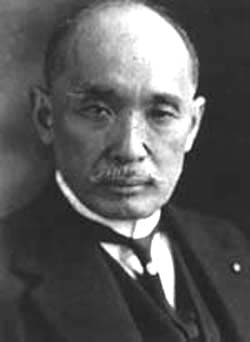
Racial Equality Proposal
The Racial Equality Proposal (Japanese: 人種的差別撤廃提案, Hepburn: Jinshutekisabetsu teppai teian, lit. "Proposal to abolish racial discrimination") was an amendment to the Treaty of Versailles that was considered at the 1919 Paris Peace Conference. Proposed by Japan, it was never intended to have any universal implications, but one was attached to it anyway, which caused its controversy.[1] Japanese Foreign Minister Uchida Kōsai stated in June 1919 that the proposal was intended not to demand the racial equality of all coloured peoples but only that of members of the League of Nations.[1]
Though it was broadly supported, the proposal did not become part of the treaty, largely because of opposition by the United States and the dominions of the British Empire Delegation, namely Australia, Canada and New Zealand.[2]
The principle of racial equality was revisited after the war and incorporated into the United Nations Charter in 1945 as a fundamental principle of international justice. However, several countries, including members of the United Nations, would continue to retain racially discriminatory laws for decades after the end of the war.
On April 11, 1919, the commission held a final session.[14] Makino stated the Japanese plea for human rights and racial equality.[15] The British representative Robert Cecil spoke for the British Empire and addressed opposition to the proposal.[16] Italian Prime Minister Vittorio Orlando spoke in favor of the statement on human rights.[17] French Senator Léon Bourgeois urged its adoption and stated that it would be impossible to reject the proposal, which embodied "an indisputable principle of justice."[18]
The proposal received a majority vote on the day,[14] with 11 of the 17 delegates present voted in favor of its amendment to the charter, and no negative vote was taken:
Total: 11 Yes
The chairman, Woodrow Wilson, overturned it by saying that although the proposal had been approved by a clear majority, the particular matter had strong opposition manifest itself (despite the lack of any actual votes against the proposal[19]) and that on this issue, a unanimous vote would be required.[20] French delegate Ferdinand Larnaude immediately stated that "a majority had voted for the amendment."[21] Meanwhile, the Japanese delegation wanted the transcript to show that a clear majority had been voted for the amendment.[21]
Though the proposal itself was compatible with the British stance of equality for all subjects as a principle for maintaining imperial unity, there were significant deviations in the stated interests of its dominions, notably Australia. As it risked undermining the White Australia Policy, Billy Hughes and Joseph Cook vigorously opposed the proposal behind the scenes and advocated against it through the British delegation. Without the support of its dominions, the British delegation could not take such a stand on principle. According to the diary of Cecil, the delegate representing the British Empire at the conference:
To placate Japan, Wilson promised to support the Japanese claims on the former German possessions in China and said that it would be Japan's reward for accepting the rejection of the proposal.[23] Furthermore, over the advice of the United States Navy, Wilson also agreed to support Japanese claims to the Marianas, Marshall, and Caroline islands in the Pacific Ocean, which Japan had occupied in 1914, as mandates that Japan would administer on behalf of the League of Nations, instead of allowing the Japanese to annex the islands outright, as they had wanted.[24] In May 1919, the peace conference formally decided that Japan would receive the Carolines, Marshall, and Marianas Islands as Class C League of Nations mandates.[25] In the 1920s, Japan violated the terms of the mandates by preventing representatives of the League from visiting the islands, by bringing in settlers on the islands, and by building military bases, most notably at Truk, which became the main Japanese naval base in the Pacific.[25] The Canadian historian Margaret Macmillan noted that some of the islands (most notably Truk, Tinian, and Saipan) that had been awarded to Japan in 1919 to be developed peacefully would become the scenes for famous battles in World War II.[25]
Aftermath[edit]
Cecil felt that British support for the League of Nations was far more important than the clause. The Japanese media fully covered the progress of the conference, which led to the alienation of public opinion towards the US and would foreshadow later, broader conflicts.
In the US, racial riots resulted from deliberate inaction.[26]
The international mood had changed so dramatically by 1945, that the contentious point of racial equality would be incorporated into that year's United Nations Charter as a fundamental principle of international justice.
Some historians consider that the rejection of the clause could be listed among the many causes of conflict that led to World War II. They maintain that the rejection of the clause proved to be an important factor in turning Japan away from co-operation with the West and toward militarism.[23] In 1923, the Anglo-Japanese Alliance expired. Militarists came to power resulting in Japan's rapprochement with Hitler. Prussian militarism had already become entrenched in the Imperial Japanese Army, many of whose members had expected Germany to win World War I. However, relations with Germany became even stronger in the mid-1930s while Germany had greater ties with Nationalist China.
After the Nazis gained power in Germany, Japan decided to not expel Jewish refugees from China, Manchuria, and Japan[27][28] and advocated the political slogan Hakkō ichiu (literally "eight crown cords, one roof", or "all the world under one roof")